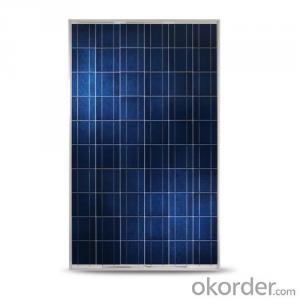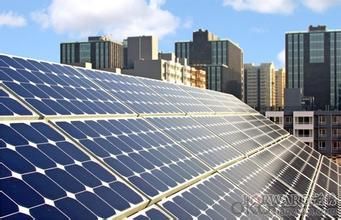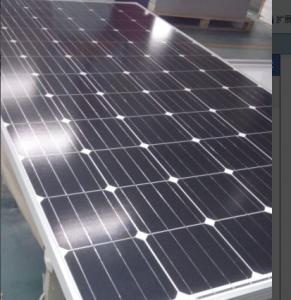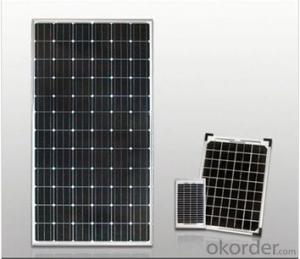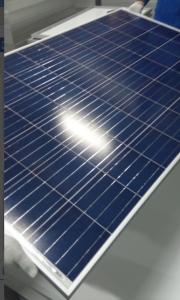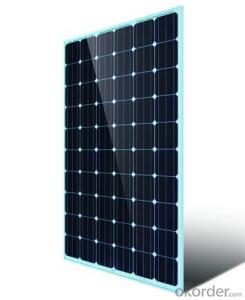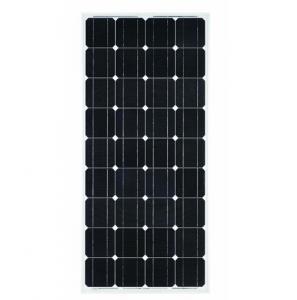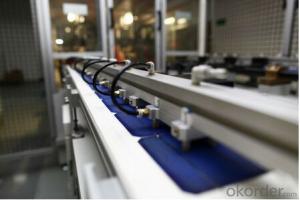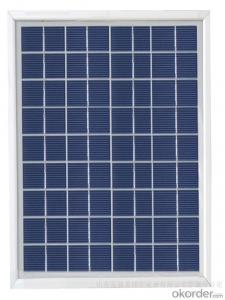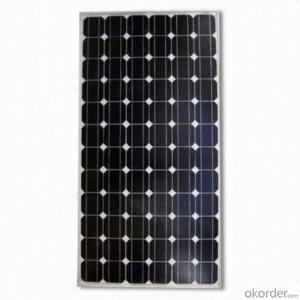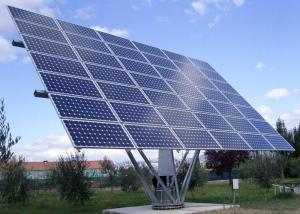White House Solar Panels:240w/245w Solar Panel with TUV IEC MCS CEC IDCOL SONCAP Certificates
- Loading Port:
- Shanghai
- Payment Terms:
- TT OR LC
- Min Order Qty:
- 1000 watt
- Supply Capability:
- 100000000 watt/month
OKorder Service Pledge
OKorder Financial Service
You Might Also Like
- TUV IEC, MCS (UK), CE, CEC (Australia), INMETRO, IDCOL, SONCAP CERTIFIED
- [EU ANTIDUMPING DUTY-FREE]
- PROFESSIONAL SOLAR PANEL MANUFACTURER SINCE 2004
FEATURES
`Long Service Life
`High Efficency Solar Cells
`Special Aluminum Frame Design
`High Transmission,Low Iron Tempered Glass - TUV IEC, MCS (UK), CE, CEC (Australia), INMETRO, IDCOL, SONCAP CERTIFIED
- [EU ANTIDUMPING DUTY-FREE]
- PROFESSIONAL SOLAR PANEL MANUFACTURER SINCE 2004
FEATURES
`Long Service Life
`High Efficency Solar Cells
`Special Aluminum Frame Design
`High Transmission,Low Iron Tempered Glass
`Advanced Cell Encapsulation
APPLICATIONS
`Solar power stations
`Rural electrification, Small home power systems
`Power supply for traffic, security, gas industry
`12V and 24V battery charging system
`Other industrial and commercial applications
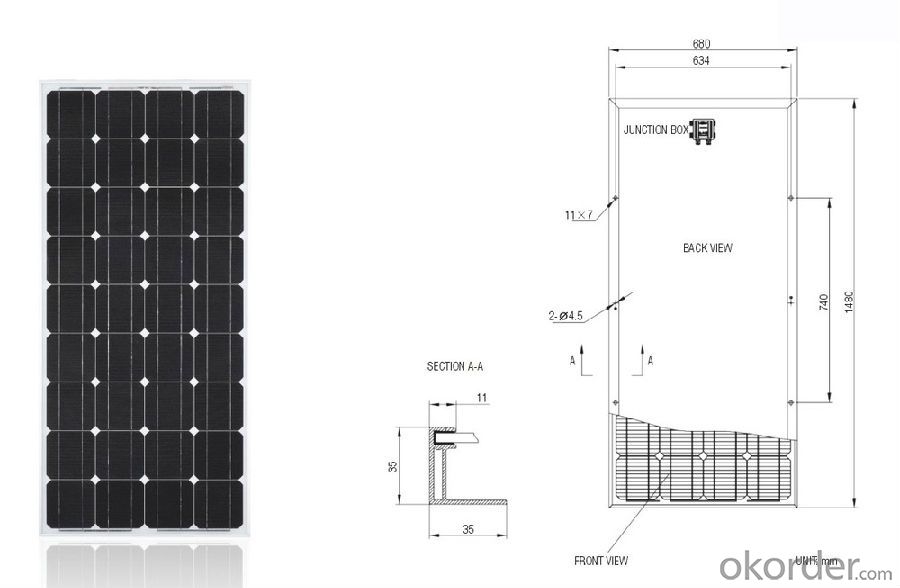
| ELECTRICAL CHARACTERISTICS | |||||||
| Model Number | KM(P)230 | KM(P)235 | KM(P)240 | KM(P)245 | KM(P)250 | ||
| Maximum Power as per STC | Pmax(W) | 230 | 235 | 240 | 245 | 250 | |
| Power Tolerance | % | ±3% | |||||
| Maximum Power Voltage | Vm(V) | 30.48 | 30.6 | 30.66 | 30.98 | 31.29 | |
| Maximum Power Current | Im(A) | 7.6 | 7.68 | 7.83 | 7.91 | 7.99 | |
| Open Circuit Voltage | Voc(V) | 36.6 | 36.72 | 36.84 | 37.38 | 37.5 | |
| Short Circuit Current | Isc(A) | 8.17 | 8.23 | 8.32 | 8.42 | 8.5 | |
| Maximum System Voltage | VDC | 1000 | |||||
| Cell Efficiency | % | 15.8 | 16.1 | 16.4 | 16.8 | 17.1 | |
| Module Efficiency | % | 14.1 | 14.4 | 14.7 | 15.0 | 15.3 | |
| Cells per Module | Pcs | 60 | |||||
| Cell Type | Polycrystalline silicon | ||||||
| Cell Size | mm | 156 x 156 | |||||
| Bypass Diodes | Pcs | 12Amp, 6 pcs | |||||
| Max. Series Fuse Rating | A | 15A | |||||
| Temperature coefficient of Isc | %/°C | 0.05 | |||||
| Temperature coefficient of Voc | %/°C | -0.35 | |||||
| Temperature coefficient of power | %/°C | -0.47 | |||||
| NOCT- Nominal operating cell temperature | °C | 47 ± 2 | |||||
| Operating Temperature | °C | -40 ~ +85 | |||||
| MECHANICAL CHARACTERISTICS | |||||||
| Dimensions | mm | 1650 x 990 x 50 | |||||
| Weight | Kg | 19.8 | |||||
| Type of Junction Box | TUV certified, IP65 | ||||||
| Cable Type, Diameter | TUV certified, 4mm2, 90 cm in length | ||||||
| Connector | compatible to Type 4 (MC4) | ||||||
| Tempered Glass | 3.2 mm, high transmission, low iron | ||||||
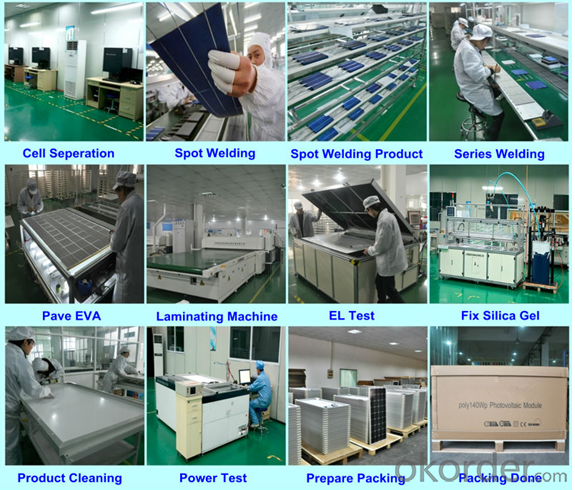 Packing
Packing
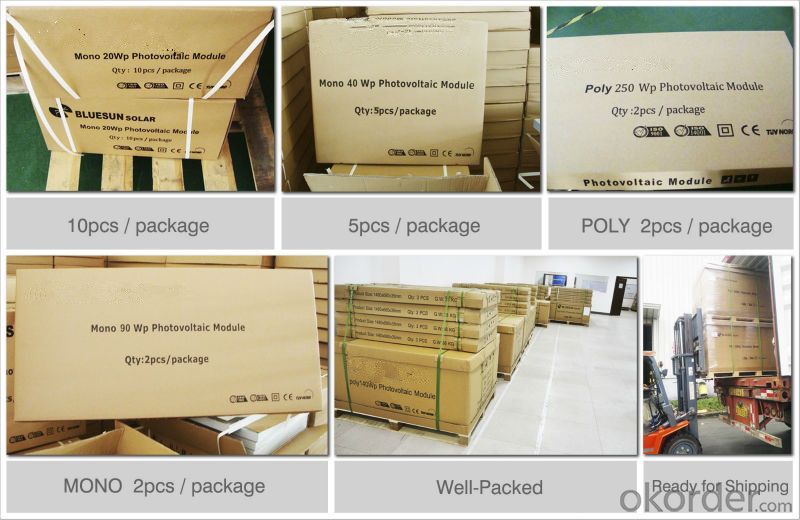
FAQ
1. What kind of Solar Cells does it have
---poly crystalline 156*156mm and 125*125mm or mono 125*125mm and 156*156mm
2. Is the front panel Glass or Plastic
---Tempered glass 3.2mm thickness or adjust to what you need, Light transmittance up to 95%.
3. Does it meet Europe Standards for Solar Energy
---This is TUV approval products, all the producing procedure apply TUV&UL.
4. What is the Efficiency level
--- Between 16-18.9% for solar cells.
5. What is the Nominal Voltage
--- 18v 20v 24v 36v 30v 48v , and so on, we can adjust to what you need.
6. What is the Warranty Period, How many years?
Power efficiency warranty:
---90% in 10 years; 80% in 25 years.
- Q: What materials are solar panels made of?
- Solar panels are typically made of photovoltaic (PV) cells, which are primarily composed of silicon, along with other materials such as metal frames, glass, and encapsulation materials.
- Q: i dont wanna buy a solar panel becuase its too exspensive, i dont want use technical stuff i want to use every day materiels, but i need to know asap plzzzz.
- Solar panel is a sheet of highly expensive, purest Silicon manufactured in a factory of exceptional killingly stringent specifications. You can't do that as a cottage industry, at least the material.
- Q: Do they really save energy? Cut or almost eliminate your electricity bill, if so, how much?Do they have a reserve unit to save electricity that I don't use, to use when the sun is not out?Can it produce enough electricity to cool a house and keep lights and appliances runningLastly, how much are the panels are running for.
- In California, if a house is now connected to the grid, typically, they stay connected to the grid even after installing solar electric panels. In this way, no batteries are required to run at night or over cloudy periods. And the house gets credit for energy generated in excess of usage. This scheme also means that you can size your array to only generate a portion of your electrical usage, which is also the usual decision. Since you mention cooling, an air conditioner is a big power drain. We have no A/C, so a modest 3 kW array is enough to supply all our electrical needs. If we had central air conditioning, that number might be doubled or tripled. Your best bet is to contact a local solar installer to do an analysis and quote on your house. How much it costs, and whether you actually will save money in the long run, depends on where you live, and how much electricity you use. Our system cost $2,000 after all rebates and credits.
- Q: Can solar panels power an electric car?
- Yes, solar panels can power an electric car. Solar panels convert sunlight into electricity, which can then be used to charge the batteries of an electric car. This allows the car to run on clean, renewable energy and reduces reliance on fossil fuels.
- Q: My family and I are looking into solar panels for our home. But I'm unsure how it would be priced. This month our home used ,623 kwh. The solar panel company said we should expect $6-$9 per watt used. What would that put as at?
- I don't know how they calculate out the savings, but ask your local supplier. The expensive part of heating hot water is the initial starting of the warming of the cold water, but this is where solar panels come to play a very good role in preheating home hot water cylinders. Sometimes the water coming from the solar panels is hotter than what the hot-water cylinder thermostat is set for this is one way you save money Another equally expense of heating hot-water is when the element thermostat keeps the temperature up to the desired setting of the thermostat. Where as having a solar panel or two the hot water cylinder is only a storage container to store the hot water in! A great invention in my book! The initial costs are buying these units having them installed, but over time you will start saving money on your heating hot water costs, where you will be able to waste a bit of hot water and not worry about the costs going to waste or down the drain... I suppose you know all of this, but I'm sorry, I can't convert your conversion question, best ask the supplier to put everything in layman's terms so you can understand it better more clearly! Cheers!!
- Q: Can solar panels be installed on public transportation systems?
- Yes, solar panels can be installed on public transportation systems, such as buses and trains, to harness solar energy and reduce their reliance on traditional energy sources. This can help to make public transportation more sustainable and environmentally friendly.
- Q: Can solar panels be used in areas with high wind speeds?
- Yes, solar panels can be used in areas with high wind speeds. However, it is important to consider the structural integrity of the mounting system to ensure that the panels can withstand strong winds. Additionally, proper installation and maintenance are crucial to ensure the longevity and efficiency of the solar panels in such conditions.
- Q: What is the lifespan of solar panel batteries?
- The lifespan of solar panel batteries can vary depending on various factors such as the type of battery, its quality, and usage patterns. Generally, solar panel batteries are designed to last between 5 to 15 years. However, with proper maintenance and care, some batteries have been known to last even longer.
- Q: Currently being sold today! I know SunPower corp. commercial panels are about 20%.
- About 20-22 percent is about right for panels affordable by most consumers. Even then, you still only get enough power to light a couple of lights for $400-$500, and only works when the sun is shining.
- Q: Can solar panels be installed on a shaded roof?
- Yes, solar panels can be installed on a shaded roof, but their efficiency may be significantly reduced. The amount of shade and its duration throughout the day will determine the impact on energy production. It is recommended to assess the roof's shading factors and consult with a solar panel installer to determine the feasibility and potential output of a shaded installation.
Send your message to us
White House Solar Panels:240w/245w Solar Panel with TUV IEC MCS CEC IDCOL SONCAP Certificates
- Loading Port:
- Shanghai
- Payment Terms:
- TT OR LC
- Min Order Qty:
- 1000 watt
- Supply Capability:
- 100000000 watt/month
OKorder Service Pledge
OKorder Financial Service
Similar products
Hot products
Hot Searches
